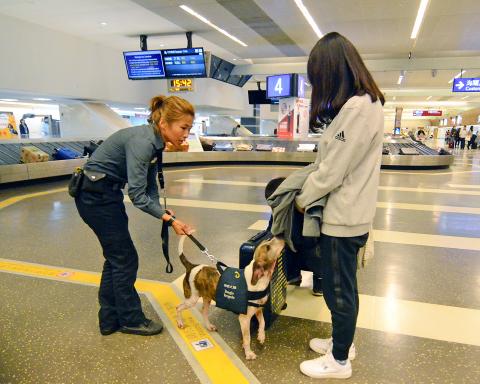The Council of Agriculture (COA) yesterday said it would not ban the use of kitchen waste as pig feed, despite increasing calls from hog farmers and experts for a ban to prevent the transmission of African swine fever.
More than 280 hog farmers on Friday in a joint statement called on the council to prohibit feeding pigs leftovers.
Using leftovers to feed pigs is a backward practice and provides a hotbed for virus transmission, they said, urging the council to protect and upgrade the hog industry.

Photo: CNA
Instead of imposing an immediate ban, the council is encouraging farmers to switch to commercial fodder by providing subsidies and technical assistance, COA Chief Secretary Chang Chih-sheng (張致盛) told a news conference in Taipei.
The council last year identified 2,045 hog farms using leftovers as pig feed, but that number has fallen to 1,776 after the rest had switched to commercial fodder by yesterday, Chang said.
Leftovers are just one channel for virus transmission and the risk can be minimized by heating leftovers to 90°C for at least an hour, as they are required to do, Department of Animal Industry Deputy Director Wang Chung-shu (王忠恕) said.
The council next week would meet with experts and local representatives to further discuss the matter, he added.
Taiwan produced about 970,000 tonnes of leftovers in 2017, of which 770,000 tonnes were used as pig feed, Environmental Protection Administration (EPA) Bureau of Environmental Inspection Deputy Inspector-General Lin Jso-hsiang (林左祥) said.
If feeding kitchen waste to pigs were banned, restaurants and hotels producing more than 16kg of leftovers per day would need to contract firms to process them at disposal fees of NT$2,000 to NT$3,000 (US$64.80 to US$97.20) per tonne, he said.
The nearly 200 firms nationwide that produce more than 1 tonne of leftovers per day are advised to install their own fast-fermenting devices, Lin said, adding that the agency would meet with such businesses next week.
Yunlin County Commissioner Chang Li-shan (張麗善) of the Chinese Nationalist Party (KMT) on Dec. 25 announced a ban on using leftovers as pig feed, making it the first municipality to do so.
The move drew criticism from Premier William Lai (賴清德).
The county produces about 90 tonnes of leftovers every day, which are now sent to local plants for disposal, including Nan Ya Plastics Corp’s recycling plant, Yunlin Environmental Protection Bureau Director Chang Chiao-wei (張喬維) said via telephone yesterday.
The central government should fully support the county’s plan to do so and follow suit by announcing a national ban, he said, asking whether the central government would be ready to tackle all leftovers if the disease enters the nation.
Meanwhile, customs officials had as of Friday intercepted 127 illegal imports of meat products, including 44 pork products from China, since Dec. 18, when it raised fines for first-time offenders to NT$200,000 and repeat offenders to NT$1 million, council data showed.
Chunghwa Post Co yesterday reminded people not to import any meat products from overseas, not to order foreign meat products by mail and not to visit foreign farms.

Chinese Nationalist Party (KMT) Chairman Eric Chu (朱立倫), spokeswoman Yang Chih-yu (楊智伃) and Legislator Hsieh Lung-chieh (謝龍介) would be summoned by police for questioning for leading an illegal assembly on Thursday evening last week, Minister of the Interior Liu Shyh-fang (劉世芳) said today. The three KMT officials led an assembly outside the Taipei City Prosecutors’ Office, a restricted area where public assembly is not allowed, protesting the questioning of several KMT staff and searches of KMT headquarters and offices in a recall petition forgery case. Chu, Yang and Hsieh are all suspected of contravening the Assembly and Parade Act (集會遊行法) by holding

PRAISE: Japanese visitor Takashi Kubota said the Taiwanese temple architecture images showcased in the AI Art Gallery were the most impressive displays he saw Taiwan does not have an official pavilion at the World Expo in Osaka, Japan, because of its diplomatic predicament, but the government-backed Tech World pavilion is drawing interest with its unique recreations of works by Taiwanese artists. The pavilion features an artificial intelligence (AI)-based art gallery showcasing works of famous Taiwanese artists from the Japanese colonial period using innovative technologies. Among its main simulated displays are Eastern gouache paintings by Chen Chin (陳進), Lin Yu-shan (林玉山) and Kuo Hsueh-hu (郭雪湖), who were the three young Taiwanese painters selected for the East Asian Painting exhibition in 1927. Gouache is a water-based

Taiwan would welcome the return of Honduras as a diplomatic ally if its next president decides to make such a move, Minister of Foreign Affairs Lin Chia-lung (林佳龍) said yesterday. “Of course, we would welcome Honduras if they want to restore diplomatic ties with Taiwan after their elections,” Lin said at a meeting of the legislature’s Foreign Affairs and National Defense Committee, when asked to comment on statements made by two of the three Honduran presidential candidates during the presidential campaign in the Central American country. Taiwan is paying close attention to the region as a whole in the wake of a

OFF-TARGET: More than 30,000 participants were expected to take part in the Games next month, but only 6,550 foreign and 19,400 Taiwanese athletes have registered Taipei city councilors yesterday blasted the organizers of next month’s World Masters Games over sudden timetable and venue changes, which they said have caused thousands of participants to back out of the international sporting event, among other organizational issues. They also cited visa delays and political interference by China as reasons many foreign athletes are requesting refunds for the event, to be held from May 17 to 30. Jointly organized by the Taipei and New Taipei City governments, the games have been rocked by numerous controversies since preparations began in 2020. Taipei City Councilor Lin Yen-feng (林延鳳) said yesterday that new measures by